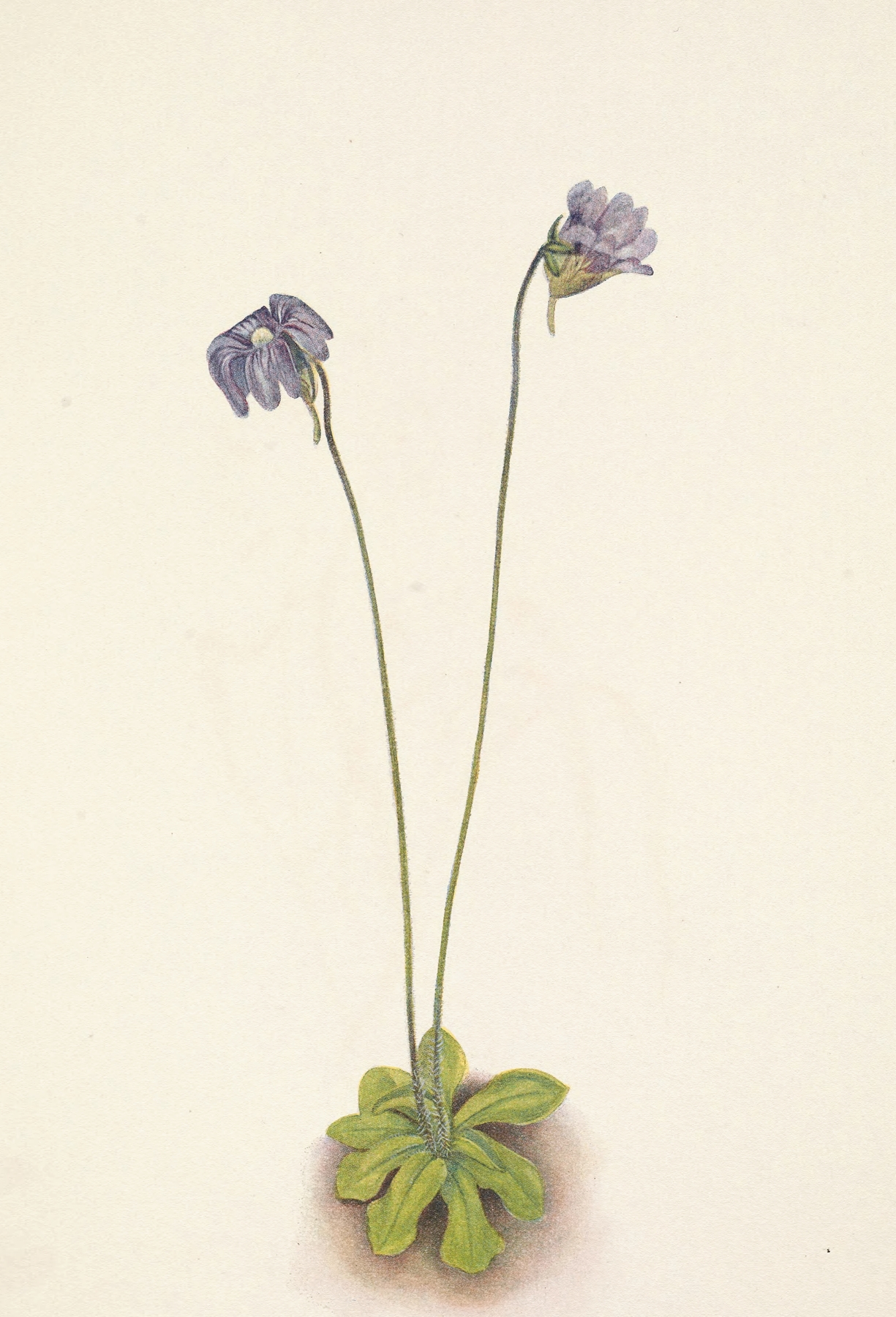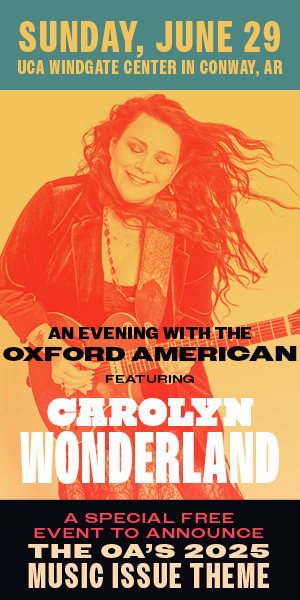At the Top of Your Lungs Is a Power Imbalance
By Kendra Allen

Purple Butterwort. Pinguicula elatior, 1925, by Mary Vaux Walcott. Courtesy of Artvee
This exclusive feature is an online extension of the OA’s annual music issue. Order the Ballads Issue and companion CD here.
BARGAINING WITH MY LIMBS
By the age of five, I’m already in love with loud ballads and the woman who birthed me. She grips the steering wheel, swapping glances of the road and me while making a concentrated effort to push through the first verse of Teena Marie’s “Out On A Limb.” The real work is doing it on key. But I’m my mother’s assistant. Her lover. The one who leaps for her adoration as we try to keep up with the double time of I feel so insecure and yet I’ve never felt so sure. Some bonds are sonic experiences. I’m low in the backseat, spastically lifting myself to see outta the window as she drives us through Dallas toward people whose humanity she cares to capture because they ask the most of her. & she needs to be needed—so sometimes, she forgets that I’m there, unless I’m performing. I’m paying attention to Teena’s pitch and the loop of the piano. It’s always a piano. I mouth its sound for six minutes straight. The song blasts open after the bridge. It brands my voice box: how much I love her and these brash, desperate songs about what love is, what love should be, and most times, what love can’t sustain. My mother says whatever either of us have, we split. She takes the simplicity of the chorus. I take the wailing of the adlibs. She sings the verses. I direct the band. I move from a car seat to a front seat, and she swerves on the downbeat to Teena’s giving in to you again. I offer to drive. She lets me whenever we’re alone. That’s the trick, nobody else can see it. We switch roles. We shift in and out of positions. The piano keys heighten, but I follow through on our promise. I put her first for almost thirty years of my life. I’d do anything to not lose her. I think I need her. We smile at each other and bang on the invisible bongos at the peak of Teena requesting to be held. I don’t receive many hugs, but I learn every inflection, every pause. That’s how I know a ballad is powerful: it forces you to go full out, toward perfection.
DEPRESSION AIN’T AS BEAUTIFUL AS PRINCE IS ON STAGE
Watching Purple Rain is a summer staple for my cousin and me. We like witnessing the moment The Kid compels Apollonia—and us—to choose. Him. So all night, we rewind the baby, baby, baby begs from “The Beautiful Ones” with our mouths open. The scene is so entrancing that we root for The Kid to get who he wants, regardless of what she wants. But that tends to be the thing that makes pretty men seem poetic—their boldness. I swear, meaning can be made of anything. Passion just gotta be present & sensuality becomes a song structure. The desire brings him to his knees and then his back. It really is beautiful, unless you think about how he has a plethora of more dire issues to tend to other than persuading a person to romantically reciprocate. But me and my cousin still fall in fast love with the shameless yearning—its brashness—the same way our mothers did decades before. It makes me practice surrender on the carpet. This involves convulsions. And kitten heels. That’s the legacy. My cousin stares at me like I lost my mind. My mother tells me all about the Southern cities she’s crossed into so she could dance in the stands at a Prince show. She’s adamant that, “Ain’t no betta performer!” and I think of how powerful seduction can be if you know how to play it right. How it makes you a fangirl for women who leave you so confused. Confusion being the reason you always seem to lose. One Mother’s Day, I write the lyrics to the hook of “Adore” in her card and I think I mean it, because I reminisce—on standing with the remote in hand rehearsing and glamorizing all the typical themes of loss within the lyrics of what I consider an embodied song. I need to know what it took for The Kid to become big enough to plead like that in public. Was it the force of urgency? The instrumentation? The breaths taken between phrases in order to prepare to ask another: Do you want him / or do you want me and still be able to admit: Cause I want you. There’s no doubt that the ego is blatantly on display. Ego is prolly the only thing happening when you start giving speeches in the middle of songs, but it looks tender. Like you heard a screeching power chord and became desperate to confess. And then you change cities because you shouldn’t have to stretch so far for someone to meet you where you at. But that’s all a part of the process we tend to put ourselves through, in order to perform better.
DENIAL IS MINE, AGAIN
At an after-school talent show, I belt a Mariah Carey deep cut in desperate need of water—and a reality check—by the time I get to the first chorus. “Mine Again” is the most vocally challenging song on The Emancipation of Mimi; which is why the melody stayed stuck in my head. I’d spend hours ruminating over When love was yours, and mine, obsessed with tryna figure out every intricacy within her notes. And although I’m not a singer, I was unaware that I should feel shame about any of my interests. That came later. So I stood in the middle of the gym floor; always eager to interpolate public displays of longing. Used to ramming my fingers into anyone with a voice. Any woman who felt explicit, I would perform as—or—for. My mother sat in the bleachers. She loves to sing. She can sing. That’s why she’s usually standing, being seen, singing along, and louder. A camcorder attached to her wrist. I learn I don’t like being looked at. I know my limits and love the intimacy of building behind the scenes. That way I can mess up, in peace. But I must be doing okay, because the people clap. I grip the mic tight to avoid shaking, but my mother feels good. Afterwards, I stand beside this personification of pride. I’m constantly reminded, “Girl, yo mama is yo #1 fan!” I don’t even have to tell people who she is. It can’t be missed. They say we look just alike. But a mimic is not a mirroring. A matriculation is not a memory. It’s a motive. I smile with my mouth closed. I’m grateful. I’m so grateful. I hate the thought of having a fan. It’s not love. They’ll lie to you, with a smile. ’Til this day, I can’t comprehend how Mariah sang that song—made that album—without ruining her gifts. And I don’t understand why she wanted to make a “comeback” after the way she was treated. Maybe support is just a projection of an unidentified feeling. ’Til this day, finding pleasure in documenting my fear is still a trigger for me. That—and, long captions… being called brave… methodological presentations of parenthood… surprise parties… product-placing my personhood… high notes… trophy rooms… etc…
ANGER IS WHERE I STAY NOW THAT I CAN FEEL
I’ve been busy since I was like eight, so almost twenty years have passed before I realize it’s time to break up with my mother. This decision extends across states. Texas. Illinois. Alabama. Then Texas, again. Most of my life has been a search for a sector of space where I can pretend I’m in the middle of a music video, so I drive up and down an empty backstreet for hours crying to the bridge of Usher’s “Climax.” Over and over, I slide into an intimacy I can’t seem to capture in breathing. I feel behind in living. I only love children, and my mother—who has every single one of my accomplishments plastered in a single room. This shrine of Kendra highlights. My degrees. My books. Newspapers I’ve been profiled in. Anything I’ve ever won, all the way down to perfect attendance. Her walls covered in a mural of my many faces. Moments I never mention, or see, as memorable. I barely remember any of it, but I’m writing a childhood memoir & my mother can’t wait ’til it’s out so she can tell her coworkers how many copies she’s bought. She’ll even sell it to them; tell her Facebook friends to purchase it if they wanna get our family’s “tea.” The book cover on a cup. Anyway, the “Climax” bridge. It’s one of the greatest minutes of music ever made. I promise you, Usher’s peers are none of the men the masses have attempted to compare him to. His vocal peers are women. The song is sung in falsetto, and that choice, was a decision; there to remind us how desperate we are. I press down on the gas as Usher cranks through the strain of I can’t get what we had out my mind. It sounds painful, but I feel it open—then name—every emotion I don’t know how to feel without assistance. In the music video, he drives down a slope tryna maneuver away from his heart while I speed as potently as the pace of the production. The beat feels like a late-night knock, and rain, pattering. The wind and escalation wrapping listeners up into a trance, a palpitation. A mix of resuscitations. It’s peak cinema. It redefines what r&b can bend once it’s free. But a sense of panic always comes with professionalism. I love a track that triggers an anxiety attack; Usher reminding me it’s time to finally follow through. I punch at the steering wheel and restart the minute over. It sounds like the third act of a paranormal film, subtly fleshed out. Each bang—each failure to see—grander than the last. Usher was my first crush. I was three, sitting in a car singing “Bedtime”: feels like I’m going through withdrawals. The only shape that needs to be corrected is the one with no points—a circle. I drive faster. I turn sharper. My mother needing me. To feel better. About herself. Some days, I can’t let myself notice it, or I’ll crash. So I try again. Drive her down this road with “Climax” on repeat. She’s the only one I ever invite into my most peaceful places. We sing to the cows. We know every word. She tells other people about my secrets and spaces. With a smile, she continues to sing over me, stares outta the window, waiting for her investment to pay off.
ACCEPTING WHO YOU ARE IS AN OVERNIGHT ENDEAVOR
Texas is entirely too big a state. I live four hours away from my mother. And I’m still not thirty. I can’t believe it. On a Friday night, I sit in a McDonald’s line and turn the knob up when “4 am” by Melanie Fiona builds through the Bluetooth. She’s so good. An all-around underrated powerhouse of an artist, so I gotta hold my phone to my lips. Yell until my jaw pops. Throw my head back in an exasperated fashion. It makes me think of a time when I was asked how can I feel harmony when I’m always looking for the pauses. But I truly believe that’s where the power lies, in questions. The synchronization surfacing around Who knew that my heart could have a bruise. I stop the song and start jotting down ideas for essay structures and playlist sequences. I’m a stress eater, so I bite my nails. Restart the track. Think about how Melanie Fiona is in equal parts distress and delusion. How I feel her when she starts the song with, Sitting here feeling kinda crazy… ; how I disappear for months, and when my mother finally gets me on the phone, the first thing she says is: “What kinda person don’t wanna talk to they mama?!” & it’s quiet on the line, but I almost laugh at the question. I don’t say anything, because I’m tired of being fed from. I breathe, wondering how it feels when [a] lover won’t answer. My mother says, “You still tryna make this writing thing work; what about teaching?” I don’t say anything, not even that I got a new book deal, but I’m thinking I’m ’bout to hurt somebody. She says, “I thought you was getting help with yo mental stuff.” I say, “You are my mental stuff,” and there’s a pause, but I’m hearing that makes her happy; can feel the smirk through the phone, so I say, “Aight girl, I’m finna go; listening to this song.” She asks what song. I say it really don’t matter no more. I end the call; “4 am” falling back through speakers. I turn the knob completely down on I think I might lose it. Every song I ever felt emotionally connected to makes me think of a parent. But I only know this now. Then, I just thought I loved sad songs. And yes, I’m going back to therapy. That Freudian shit is real. Nothing has ever felt sufficient enough. Clear, enough. Until I closed my mouth. Until I closed my eyes. Until I turned down the volume. I finish this draft. See all my delusions and distresses and desperations in three dimensions over decades. After an hour, I get to the front of the line, order a basket of fries. They forget my hot mustard, and I stay under a blanket for a week. I restart the process just to not repeat it. In love. In rage. Windows up. Windows down. Headphones in. Headphones out. She loves me. She loves me not.




